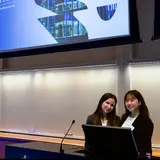Internship Spotlight: Emily Lewis ’25, Silk Grass Farms
Emily Lewis ’25 spent the summer helping a Belize agribusiness streamline its operations and leading the company’s B-Corp recertification process—as well as kayaking through mangrove forests.
We asked rising second-year MBA students to check in from their summer internships, where they applied the lessons of their first year at Yale SOM.

Internship:Silk Grass Farms: Stann Creek, Belize
Hometown: Charlotte, NC
Pronouns: she/her/hers
The SOM class you’re using on the job: Modeling Managerial Decisions, Operations Engine, Customer, and The Future of Food & Agribusiness
Go-to work lunch: No two days look the same, but we love bringing packed lunches to the Great House, our research station in the rainforest, or driving down the road to get Fry Jacks, a popular breakfast food, on the beach in the town of Hopkins.
After-work routine: When we aren’t trying to get out and explore different parts of Belize, we can be found kayaking through the mangrove forests and cayes, small islands surrounded by coral reefs, near our home in Placencia or playing pickleball in a local rec league!
Favorite thing about internship location: Belize is a relatively small country with amazing biodiversity across its main terrestrial and coastal ecosystems: rainforests, savannah, wetlands and riparian zones, coastal mangroves, and reefs. Due to the country’s relative isolation and rich biodiversity, there is an incredible amount of flora and fauna that has not yet been cataloged or researched. Three months is not nearly enough time to explore it all!
Silk Grass Farms reimagines agribusiness by merging agriculture with land stewardship and conservation, creating a unique and durable model that benefits the environment and the people of Belize. As an MBA summer intern, I immersed myself in all areas of the business by leading the B-Corp recertification process and by working with different divisions to understand process flow and business development goals. Beyond reporting our performance and impact metrics, we wanted to deliver on commitments to stakeholders and safeguard the biodiversity of the Silk Grass Wildlife Preserve, a first-growth rainforest adjacent to the farm, in perpetuity.
I was initially drawn to Silk Grass Farms because of the regenerative farming practices employed on the farm and the company’s commitment to waste nothing: even post-production biomass is repurposed into usable materials such as biochar, coco coir, compost, and upcycled animal feed. Silk Grass Farms regularly hosts researchers, government officials, and like-minded industry leaders to share learnings and best practices, working to create a sustainable model for local businesses to emulate. I was amazed by the farm’s innovative approach to creating a just and sustainable economic engine to support conservation projects, and also by its commitment to transparency: farm leaders want to provide a blueprint for other local communities seeking to drive economic development in harmony with preservation of natural resources.



I am thankful to have joined Silk Grass Farms at a time of immense growth and strategic re-alignment. Modeling Managerial Decisions, one of the classes in the core curriculum, provided me with tools to analyze market opportunities for different products across different regions. Similarly, Operations Engine provided me with the background to conduct interviews and map processes across our vertically-integrated regenerative agribusiness.
This experience was a once-in-a-lifetime opportunity to further my post-graduation goals. Not only was I immersed in an entirely new way of doing business, I also benefitted from the mentorship of two incredible leaders in innovative social enterprise, farm co-founders Mandy Cabot and Peter Kjellerup. In addition, I learned from and worked with Henry Canton, Belize’s former minister of works and the farm’s current executive director.
Before coming to SOM, I worked in real estate syndicated finance at Bank of America and real estate investments at Bridge Industrial. This internship has shown me challenges facing social enterprises and provided me with unique learning opportunities, including exploring innovative organizational structures and researching a wide array of agricultural and climate-focused topics. I have enjoyed the chance to utilize my finance experience and SOM education to contribute to projects at Silk Grass Farms and highlight the incredible work their employees do every day.
One of the reasons I chose SOM is because of how thoughtfully the school integrates student partners into academic and social life. Even so, I was surprised when my internship offer included an invitation for my partner, Jackson, to join me in Belize for the summer. Jackson offered to help out on a few projects and quickly became a part of the Silk Grass Farms team. It was incredibly fun to be coworkers and share this unique experience.
I was also able to accept this internship offer because of the support of the student-run SOM Internship Fund—the first of its kind among American business schools—which provides financial support to students who pursue social impact summer internships.
Working at an entrepreneurial, experimental, and impact-driven company is a lesson in the importance of flexibility, creativity, and transparency. The summer internship experience has allowed me to explore my interests, deepen my understanding of how businesses operate, and reflect on my goals for my remaining time at SOM. Wherever I end up after graduation, I deeply appreciate the time spent with my coworkers and am so thankful to have experienced a small part of they work they do every day to move forward wildlife conservation, regenerative agriculture, economic development, and environmental stewardship in Belize. I hope to stay involved with this organization for a very long time and am excited to watch it grow.
Emily Lewis is a recipient of the Harry and Nisha Arora ’04 MBA Scholarship (2023-2024).



